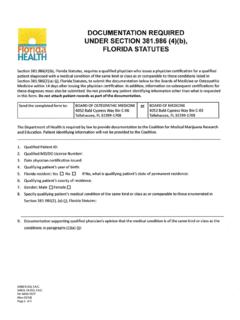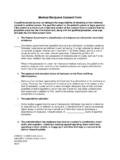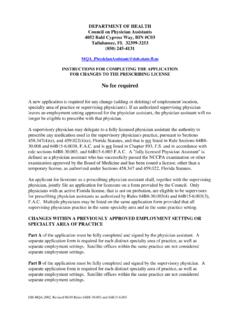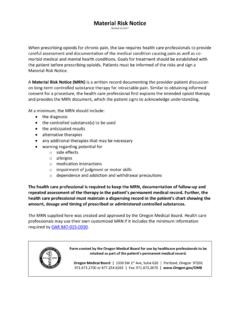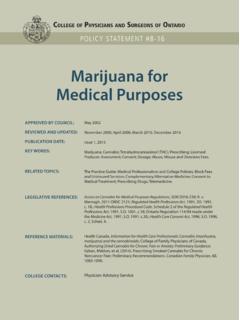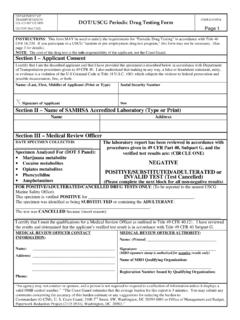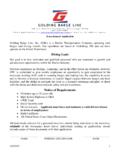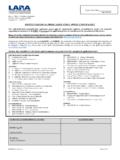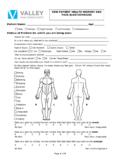Transcription of Medical Marijuana Consent Form - …
1 Medical Marijuana Consent form A qualified physician may not delegate the responsibility of obtaining written informed Consent to another person. The qualified patient or the patient's parent or legal guardian if the patient is a minor must initial each section of this Consent form to indicate that the physician explained the information and, along with the qualified physician, must sign and date the informed Consent form . a. The Federal Government's classification of Marijuana as a Schedule I controlled substance. _____The federal government has classified Marijuana as a Schedule I controlled substance. Schedule I substances are defined, in part, as having (1) a high potential for abuse; (2).
2 No currently accepted Medical use in treatment in the United States; and (3) a lack of accepted safety for use under Medical supervision. Federal law prohibits the manufacture, distribution and possession of Marijuana even in states, such as Florida, which have modified their state laws to treat Marijuana as a medicine. _____When in the possession or under the influence of Medical Marijuana , the patient or the patient's caregiver must have his or her Medical Marijuana use registry identification card in his or her possession at all times. b. The approval and oversight status of Marijuana by the Food and Drug Administration. _____Marijuana has not been approved by the Food and Drug Administration for marketing as a drug.
3 Therefore, the manufacture of Marijuana for Medical use is not subject to any federal standards, quality control, or other oversight. Marijuana may contain unknown quantities of active ingredients, which may vary in potency, impurities, contaminants, and substances in addition to THC, which is the primary psychoactive chemical component of Marijuana . c. The potential for addiction. _____Some studies suggest that the use of Marijuana by individuals may lead to a tolerance to, dependence on, or addiction to Marijuana . I understand that if I require increasingly higher doses to achieve the same benefit or if I think that I may be developing a dependency on Marijuana , I should contact Dr. _____ (name of qualified physician).
4 D. The potential effect that Marijuana may have on a patient's coordination, motor skills, and cognition, including a warning against operating heavy machinery, operating a motor vehicle, or engaging in activities that require a person to be alert or respond quickly. 64B8ER17-1 ( , ). 64B15ER17-1 ( , ). DH-MQA-5026. 08/17. _____The use of Marijuana can affect coordination, motor skills and cognition, , the ability to think, judge and reason. Driving under the influence of cannabis can double the risk of crashing, which escalates if alcohol is also influencing the driver. While using Medical Marijuana , I should not drive, operate heavy machinery or engage in any activities that require me to be alert and/or respond quickly and I should not participate in activities that may be dangerous to myself or others.
5 I understand that if I drive while under the influence of Marijuana , I can be arrested for driving under the influence.. e. The potential side effects of Medical Marijuana use. _____Potential side effects from the use of Marijuana include, but are not limited to, the following: dizziness, anxiety, confusion, sedation, low blood pressure, impairment of short term memory, euphoria, difficulty in completing complex tasks, suppression of the body's immune system, may affect the production of sex hormones that lead to adverse effects, inability to concentrate, impaired motor skills, paranoia, psychotic symptoms, general apathy, depression and/or restlessness. Marijuana may exacerbate schizophrenia in persons predisposed to that disorder.
6 In addition, the use of Medical Marijuana may cause me to talk or eat in excess, alter my perception of time and space and impair my judgment. Many Medical authorities claim that use of Medical Marijuana , especially by persons younger than 25, can result in long-term problems with attention, memory, learning, drug abuse, and schizophrenia. _____ I understand that using Marijuana while consuming alcohol is not recommended. Additional side effects may become present when using both alcohol and Marijuana . _____I agree to contact Dr. _____ if I experience any of the side effects listed above, or if I become depressed or psychotic, have suicidal thoughts, or experience crying spells. I will also contact Dr.
7 _____ if I experience respiratory problems, changes in my normal sleeping patterns, extreme fatigue, increased irritability, or begin to withdraw from my family and/or friends. g. The risks, benefits, and drug interactions of Marijuana . _____Signs of withdrawal can include: feelings of depression, sadness, irritability, insomnia, restlessness, agitation, loss of appetite, trouble concentrating, sleep disturbances and unusual tiredness. _____Symptoms of Marijuana overdose include, but are not limited to, nausea, vomiting, hacking cough, disturbances in heart rhythms, numbness in the hands, feet, arms or legs, anxiety attacks and incapacitation. If I experience these symptoms, I agree to contact Dr.
8 _____ immediately or go to the nearest emergency room. _____ Numerous drugs are known to interact with Marijuana and not all drug interactions are known. Some mixtures of medications can lead to serious and even fatal consequences. I agree to follow the directions of Dr. _____ regarding the use of prescription 64B8ER17-1 ( , ). 64B15ER17-1 ( , ). DH-MQA-5026. 08/17. 2. and non-prescription medication. I will advise any other of my treating physician(s) of my use of Medical Marijuana . _____ Marijuana may increase the risk of bleeding, low blood pressure, elevated blood sugar, liver enzymes, and other bodily systems when taken with herbs and supplements. I. agree to contact Dr. _____ immediately or go to the nearest emergency room if these symptoms occur.
9 _____ I understand that Medical Marijuana may have serious risks and may cause low birthweight or other abnormalities in babies. I will advise Dr. _____ if I. become pregnant, try to get pregnant, or will be breastfeeding. h. The current state of research on the efficacy of Marijuana to treat the qualifying conditions set forth in this section. ____ Cancer There is insufficient evidence to support or refute the conclusion that cannabinoids are an effective treatment for cancers, including glioma. There is evidence to suggest that cannabinoids (and the endocannabinoid system more generally) may play a role in the cancer regulation processes. Due to a lack of recent, high quality reviews, a research gap exists concerning the effectiveness of cannabis or cannabinoids in treating cancer in general.
10 There is conclusive evidence that oral cannabinoids are effective antiemetics in the treatment of chemotherapy-induced nausea and vomiting. There is insufficient evidence to support or refute the conclusion that cannabinoids are an effective treatment for cancer-associated anorexia-cachexia syndrome and anorexia nervosa. ____ Epilepsy There is insufficient evidence to support or refute the conclusion that cannabinoids are an effective treatment for epilepsy. Recent systematic reviews were unable to identify any randomized controlled trials evaluating the efficacy of cannabinoids for the treatment of epilepsy. Currently available clinical data therefore consist solely of uncontrolled case series, which do not provide high-quality evidence of efficacy.




